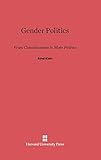Gender Politics : From Consciousness to Mass Politics / Ethel Klein.
Material type: TextPublisher: Cambridge, MA : Harvard University Press, [2013]Copyright date: ©1984Edition: Reprint 2014Description: 1 online resource (209 p.) : illustrationsContent type:
TextPublisher: Cambridge, MA : Harvard University Press, [2013]Copyright date: ©1984Edition: Reprint 2014Description: 1 online resource (209 p.) : illustrationsContent type: - 9780674864009
- 9780674864016
- Feminism
- Sex role
- Sozialwissenschaften, Soziologie, Anthropologie
- Women's rights
- Feminism -- United States -- History -- 20th century
- Sex role -- United States -- History -- 20th century
- United States -- Feminism, to 1979
- Women -- Political activity -- United States -- History -- 20th century
- Women's rights -- United States -- History -- 20th century
- SOCIAL SCIENCE / General
- 305.4/2/0973
- online - DeGruyter
| Item type | Current library | Call number | URL | Status | Notes | Barcode | |
|---|---|---|---|---|---|---|---|
 eBook
eBook
|
Biblioteca "Angelicum" Pont. Univ. S.Tommaso d'Aquino Nuvola online | online - DeGruyter (Browse shelf(Opens below)) | Online access | Not for loan (Accesso limitato) | Accesso per gli utenti autorizzati / Access for authorized users | (dgr)9780674864016 |
Browsing Biblioteca "Angelicum" Pont. Univ. S.Tommaso d'Aquino shelves, Shelving location: Nuvola online Close shelf browser (Hides shelf browser)

|

|

|

|

|

|

|
||
| online - DeGruyter The Astrological History of Masha'allah / | online - DeGruyter Pakistan : The Heart of Asia, Speeches in the United States and Canada, May and June, 1950 by the Prime Minister of Pakistan / | online - DeGruyter The Romantic Novel in England / | online - DeGruyter Gender Politics : From Consciousness to Mass Politics / | online - DeGruyter The Economic Structure of Tort Law / | online - DeGruyter The Language of Ethics / | online - DeGruyter Walt Whitman's Workshop : A Collection of Unpublished Manuscripts / |
Frontmatter -- Acknowledgments -- Contents -- Introduction Consciousness and Politics -- One. Political Mobilization of Women -- Two. From Housework to the Marketplace -- Three. The Decline of Motherhood -- Four. Changing Patterns of Marriage -- Five. The Rise of Feminist Consciousness -- Six. Sex and Feminism -- Seven. Paths to Feminism -- Eight. The Women's Movement -- Nine. The Women`s Vote -- Conclusion Gender and the Future -- Appendix Data Analyses -- Notes -- Index
restricted access online access with authorization star
http://purl.org/coar/access_right/c_16ec
With dramatic suddenness, the feminist movement emerged on the social scene in the late 1960s, and by 1980 it was a political force to be reckoned with. This ground-breaking study combs a wealth of public opinion surveys and census data to discover why women have become politically active and what it means to public policy. The book focuses on two compelling questions: What are the common concerns that mobilize women, and how do these concerns shape political activism? Ethel Klein finds that a trend toward redefining women's lives has been present since the turn of the century. She examines the erosion of traditional patterns in women's roles brought about by rising divorce rates, fuller participation in the workforce, and longer lives. Klein argues that the elements required for revolutionary change--such as grievances, leaders, organization, and resources--were evident long before the 1960s. What was missing was a constituency to support feminist demands. She explores in detail how the public approval of women's rights finally caught up with the need for reform. As group consciousness grew, so did public support. The two factors coalesced in the rise of activism and a full-blown women's movement. Klein tests her hypotheses on the elections of 1972, 1976, and 1980, with surprising results. She finds from election polls that men are no less feminist than women, but that women's support comes from group consciousness while men's comes from a liberal ideology. At the individual level she reveals how support of feminism affects people's political decisions--their approval of protest, their preference for collective forms of activism, and, when real alternatives are present, the votes they cast for President.
Mode of access: Internet via World Wide Web.
In English.
Description based on online resource; title from PDF title page (publisher's Web site, viewed 29. Nov 2021)


